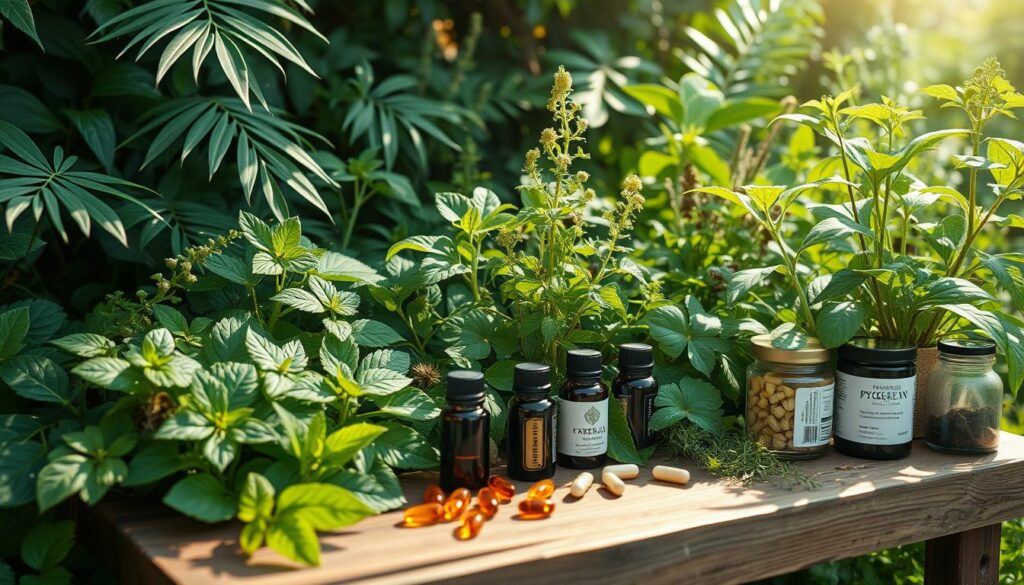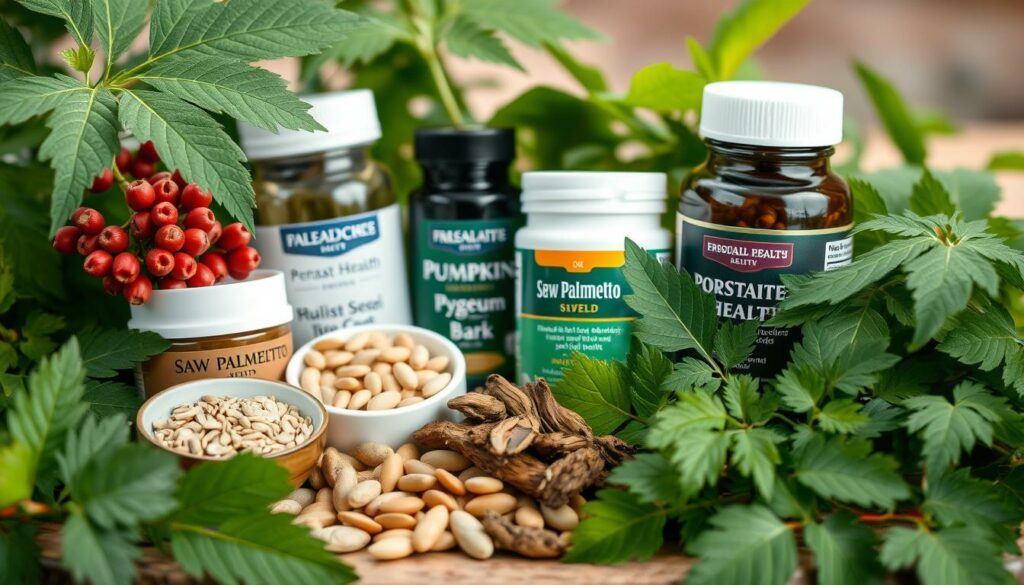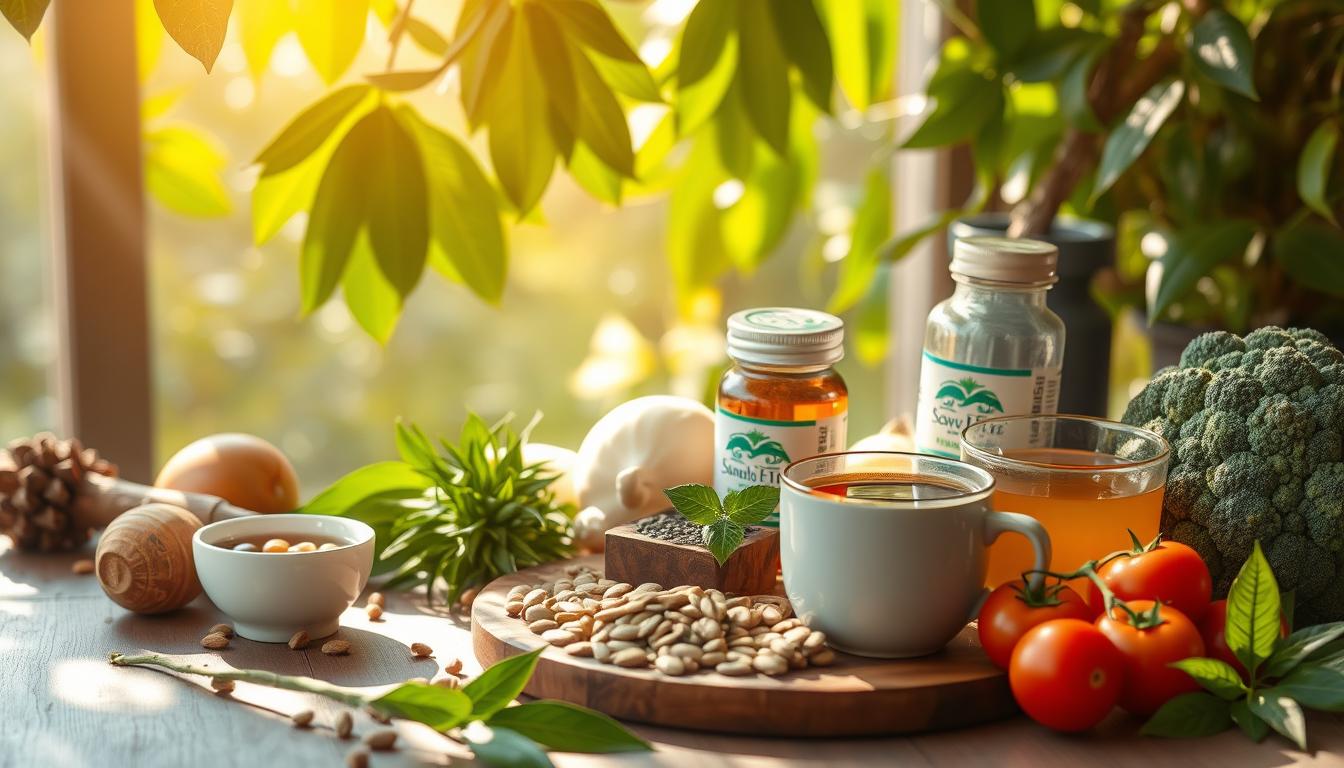By age 60, half of all men face an enlarged prostate, known as benign prostatic hyperplasia (BPH). By age 85, this number jumps to 90%. This makes finding natural ways to treat enlarged prostate a top priority for older men.
Good news is that lifestyle and diet changes can help manage BPH naturally. You don’t need surgery to do it.
Recent studies show that certain foods and activities can improve prostate health. Foods like saw palmetto extract and lycopene-rich olive oil are promising. So are zinc and green tea.
Even nettle root and cranberry are being studied for their benefits. They may help reduce symptoms and stop harmful enzymes.
Key Takeaways
- A significant number of males are likely to encounter BPH with advancing age, underscoring the importance of natural remedies for enlarged prostate.
- Studies underscore the role of various foods and supplements in either abating or exacerbating BPH symptoms.
- Adopting dietary adjustments and engaging in regular exercise form the bedrock of managing enlarged prostate naturally.
- Herbal treatments like saw palmetto, stinging nettle, and/pygeum hold promise in the natural management of BPH.
- Consultation with a healthcare provider is essential before integrating any natural supplements into one’s wellness routine.
- Maintain a holistic approach to prostate enlargement by combining behavioral changes with natural remedy use for better outcomes.
Understanding Enlarged Prostate and Its Natural Management
As you get older, it’s important to know about changes in your body. This includes conditions like Benign Prostatic Hyperplasia (BPH), or enlarged prostate. It’s expected to affect up to 90% of men over 80, so knowing how to manage it is key.
Using effective natural remedies for prostate issues can help without surgery’s risks. There are many alternative therapies for enlarged prostate out there. We focus on managing symptoms and improving prostate health naturally.
The Role of Age and Hormones in Prostate Enlargement
Hormonal changes as men age play a big role in prostate enlargement. Almost all men see some prostate growth after 25, speeding up after 50. This growth is often due to hormonal imbalances, like more dihydrotestosterone (DHT), a strong form of testosterone linked to prostate growth.
Assessing Symptoms and Impact on Quality of Life
Symptoms of an enlarged prostate can really disrupt your day. Signs include needing to urinate a lot, trouble starting to pee, and feeling like you can’t empty your bladder. These symptoms often get worse in the 60s, affecting sleep and social life, lowering your quality of life.
Benefits of a Natural Approach Over Surgical Interventions
Choosing effective natural remedies for prostate issues is a strong option. Options like saw palmetto and green tea extract are gentler than surgery. A natural approach helps symptoms and supports your body’s healing and hormonal balance. Research shows lifestyle changes and herbal supplements can greatly improve BPH symptoms, making them good alternative therapies for enlarged prostate.
Going for natural management helps with BPH’s physical side and supports your overall health. It’s a great choice for those looking for lasting health solutions.
Lifestyle Changes for Improved Prostate Health

Making certain lifestyle changes can greatly improve your life and help with enlarged prostate symptoms. It’s about adding exercise, changing your diet, and other habits to your daily life.
The Importance of Regular Exercise
Exercise is key in managing an enlarged prostate naturally. It helps with weight control and boosts your health. This can lessen symptoms of benign prostatic hyperplasia (BPH). Try to do at least 30 minutes of moderate exercise daily.
Dietary Adjustments to Support Prostate Health
Your diet is very important for prostate health. Eating lots of fruits, veggies, and healthy fats, like the Mediterranean diet, can slow prostate growth and reduce inflammation. Foods high in antioxidants and omega-3s, such as salmon and berries, are great. Also, cut down on caffeine, red meat, and high-sodium foods.
Managing Fluid Intake to Alleviate BPH Symptoms
Adjusting your fluid intake is a simple way to help with an enlarged prostate. Drink at least eight cups of water a day. But, don’t drink too much before bed to avoid midnight bathroom trips.
Role of Weight Maintenance in Prostate Size Reduction
Keeping a healthy weight is crucial for prostate size and BPH symptoms. Being overweight increases the risk of prostate problems. So, diet and exercise are key to managing your weight and health.
Lifestyle changes for prostate health do more than just help with an enlarged prostate. They also boost your overall health. Talking to your doctor can help you find the best natural remedies for your prostate, leading to better health outcomes.
Herbal Treatments for Enlarged Prostate

Looking into herbal treatments for enlarged prostate is a smart choice for those wanting natural options. Many herbs have shown promise in boosting prostate health.
Saw Palmetto: An Inhibitor of 5-Alpha-Reductase
Saw Palmetto is known for its benefits to the prostate. It blocks the enzyme 5-alpha-reductase. This action reduces testosterone turning into DHT, a hormone linked to prostate growth.
Studies show Saw Palmetto can ease urinary symptoms. It offers relief similar to Flomax but with fewer side effects.
Stinging Nettle Root and Urinary Symptom Relief
Stinging Nettle Root is another herb used for herbal treatments for enlarged prostate. It works well with other treatments to manage BPH symptoms. Reviews suggest it can reduce symptoms and shrink the prostate.
Experts recommend taking 400 to 600 milligrams daily for best results.
Rye Grass Pollen Extract and Its Potential Benefits
Rye Grass Pollen Extract shows promise in treating BPH symptoms. It may slow prostate growth and reduce inflammation. More research is needed, but early results are encouraging.
Adding these herbs to your routine, with a doctor’s advice, can help manage prostate health naturally. As research grows, natural supplements for prostate health may play a bigger role in treating BPH.
How to Shrink an Enlarged Prostate Naturally?

Many men face the issue of an enlarged prostate. Half of all men between 51 and 60 have it, and the numbers grow as men get older. Luckily, there are natural ways to help without surgery or long-term meds. We’ll look at some effective methods to reduce prostate size.
It’s key to know that an enlarged prostate, or BPH, affects a lot of men as they age. Up to 90% of men over 85 have it. So, finding natural remedies is crucial.
- Kegel Exercises: These exercises are great for men too. They strengthen the pelvic floor muscles, helping with urination and reducing swelling.
- Apple Cider Vinegar: Some people think this common item can help shrink the prostate and ease BPH symptoms.
- Nettle Root: A 2019 study showed nettle root can soothe the prostate and help with BPH. Adding nettle root supplements might be a good idea.
- Dietary Adjustments: Eating foods rich in vitamins and minerals is good for the prostate. Onions and garlic might also help manage BPH symptoms.
For more help, treatments like Prostate Artery Embolization and Rezūm Therapy are now available. They’re covered by insurance and are less invasive than surgery. They also let you get back to your daily life faster.
In summary, while BPH is common with age, there are ways to manage it. Regular exercises, natural supplements, and new medical treatments can help. Always talk to a doctor to find the best plan for you.
Natural Supplements for Prostate Health

Looking into natural supplements for prostate health offers non-invasive ways to handle prostate enlargement symptoms. Using these supplements with a holistic approach can help keep your prostate healthy. Here’s how some well-studied supplements can help you.
Zinc Supplementation to Reduce Prostate Inflammation
Zinc is key for your body, especially for prostate health. It fights inflammation, which is crucial for benign prostatic hyperplasia (BPH). A zinc deficiency might raise your risk of BPH. So, keeping zinc levels up is important for preventing and managing prostate inflammation.
The Protective Effects of Lycopene
Lycopene, found in tomatoes, is a strong antioxidant for prostate health. Studies show it can improve the prostate gland. Adding lycopene-rich foods or supplements to your diet is a good part of a holistic approach to prostate enlargement.
Green Tea Antioxidants and Prostate Function Improvement
Green tea is famous for its health benefits, thanks to its antioxidants. These antioxidants fight oxidative stress, which can harm the prostate. Drinking green tea regularly may help the prostate function better and ease BPH symptoms.
- Saw Palmetto: Its effectiveness in shrinking the prostate is debated, but it’s used to ease symptoms like a weak urine stream and frequent urination.
- Stinging Nettle Root: Common in Europe for BPH treatment, it improves urine flow and reduces nighttime bathroom trips, studies show.
- Pumpkin Seeds: High in zinc and phytosterols, they may boost urinary function and health in BPH, especially when combined with saw palmetto.
Using natural supplements for prostate health is a key part of managing prostate enlargement. Adding these supplements to your routine can naturally improve your prostate health. Always talk to a healthcare provider before starting any supplement to make sure it fits your health needs.
Importance of Pelvic Floor Exercises in Prostate Management
Pelvic floor exercises, like Kegel exercises, play a big role in prostate health. They help not just after surgery but also for managing an enlarged prostate. These exercises are key for better prostate health.
Kegel exercises help by strengthening pelvic floor muscles. Statistics show that over 50% of men over 50 can benefit from them. They help with weak urine stream, leakage, and urgency.
- Men should do about 20 Kegel exercises three to four times a day.
- It takes 9 to 12 months to control urinary leakage after surgery.
- Bladder control and urinary symptoms improve in six weeks with Kegel exercises.
To start Kegel exercises, do 10 to 20 reps three to four times a day. Increase the intensity slowly. But, avoid them if you have a catheter and start again after it’s removed.
Consistency is crucial for pelvic floor muscles. Most men see better urinary control with daily Kegel exercises. Even when symptoms get better, keep exercising to keep muscles strong.
Kegel exercises do more than just help with urination. They also boost blood flow to the prostate. This strengthens the bladder sphincter, reduces fecal incontinence, and improves sex life.
Adding these exercises to your routine can improve your prostate health and life quality. It’s a proactive step towards better prostate health.
Natural Remedies for Enlarged Prostate and Scientific Evidence
More people are looking at natural remedies for health problems. It’s important to talk about the scientific evidence on natural remedies for enlarged prostate and the efficacy of herbal treatments. These options are getting attention for helping with Benign Prostatic Hyperplasia (BPH) symptoms.
Evaluating the Efficacy of Alternative Therapies
Herbal supplements like saw palmetto and nettle root are popular for BPH treatment. Studies show that saw palmetto might help with prostate symptoms. But, results can vary, and some studies found it no better than a placebo for many men.
Nettle root, however, has shown promising results. Its antioxidants and anti-inflammatory properties help with urinary issues. This improves patients’ lives a lot.
Scientific Studies on Herbal Treatments like Saw Palmetto and Pygeum
- A study found pygeum, an African plum extract, might help with BPH symptoms. But, more research is needed to confirm this.
- Nettle root extracts have been shown to reduce BPH symptoms, as a 2019 review found. This improves overall well-being.
When looking at these treatments, we need a balanced view. We should consider both old and new scientific data. More research and testing are needed to fully understand their role in prostate health.
In conclusion, the world of natural remedies for enlarged prostate is growing. It’s backed by more scientific studies and interest. Using the findings from these studies can lead to better treatments. It also encourages safer use of herbal therapies in medical settings.
Holistic Approach to Prostate Enlargement and Diet
As you get older, it’s key to understand how your lifestyle and diet affect your health. This is especially true for managing BPH (Benign Prostatic Hyperplasia). A holistic approach to prostate enlargement means more than just treating symptoms. It’s about changing your lifestyle to boost your health overall.
Incorporating Soy and Phytoestrogens into Your Diet
Phytoestrogens are compounds in plants that are like estrogen. They’re found in soy products. These can help balance hormone levels and stop DHT, a hormone that makes the prostate grow. Eating soy-based foods like tofu, soy milk, and edamame can help manage prostate health.
Beneficial Foods: Omega-3s and Cranberries for BPH
Managing an enlarged prostate with diet means more than avoiding bad foods. It’s also about eating foods that are good for your prostate. Omega-3s in fish like salmon and tuna fight inflammation and help prostate health. Cranberries, full of antioxidants, can also lower urinary tract symptoms of BPH.
Watching what you eat, focusing on foods with antioxidants, omega-3s, and phytoestrogens, and talking to health experts can help a lot. This holistic approach shows that your diet is key to managing prostate health and your overall well-being.
Understanding and Addressing Risk Factors of Prostate Enlargement
Your prostate’s health is key, and knowing the risk factors of prostate enlargement helps you take steps to prevent BPH (Benign Prostatic Hyperplasia). Making a few lifestyle changes can greatly lower your risk and improve your health.
Established Risk Factors for Developing BPH
Age is a big factor in BPH risk, especially for men over 40 due to hormonal changes. Genetics also matter; a family history of prostate problems raises your risk. Lifestyle issues like obesity, diabetes, and heart disease also increase BPH risk. Exercise and diet can help or hurt these risks.
Preventive Behaviors to Reduce the Likelihood of Enlargement
- Regular Physical Activity: Exercise helps manage weight and lowers risks of diabetes and heart disease, which affect prostate health.
- Healthy Diet: Eating fruits, vegetables, and lean proteins while avoiding processed foods and high-fat diets supports overall health and a healthy prostate.
- Avoiding Certain Medications: Be careful with medications that might worsen prostate enlargement, like some cold and allergy meds. Talk to your doctor about safer options.
- Routine Check-ups: Regular visits to places like the Advanced Urology Institute for prostate screenings can catch BPH early, leading to better management.
By understanding and acting on these risk factors and preventive measures, you can manage your prostate health and improve your life as you age. A proactive health approach makes a big difference.
Effective Natural Remedies for Prostate Issues
Finding the right health advice can be tough, especially for managing enlarged prostate naturally. But, with the right knowledge and a holistic approach, you can use effective natural remedies for prostate issues.
Exploring Validated Natural Solutions for BPH
Recent studies show that some natural remedies and lifestyle changes can help with BPH symptoms. For example, green tea and cranberry powder may reduce prostate size by stopping harmful enzymes and lowering oxidative stress.
- Zinc supplements might help lessen inflammation and changes in the prostate cells.
- Eating foods high in lycopene, like tomatoes, and omega-3 fatty acids, found in fish like salmon, can fight inflammation and support prostate health.
- Natural extracts like saw palmetto and stinging nettle root are known to improve urine flow without major side effects.
Pairing Behavioral Changes with Natural Remedies for Enhanced Results
Adding behavioral changes to natural remedies can improve health outcomes. Drinking enough water, eating a balanced diet full of antioxidants, and exercising regularly are key to managing enlarged prostate naturally.
- Regular exercise helps keep a healthy weight, which is important since extra weight can make BPH symptoms worse.
- Eating foods high in fiber, like legumes and whole grains, helps keep hormone levels balanced and reduces prostate risks.
- Practicing double voiding—urinating twice after the first time—can help with BPH symptoms.
These effective natural remedies for prostate issues offer a complete way to manage symptoms and improve life quality. Always talk to a healthcare provider before starting any new treatment to make sure it’s right for you.
Conclusion
If you’re looking to shrink an enlarged prostate naturally, you’ve found that a mix of methods works best. Instead of just using drugs like Tamsulosin and Finasteride, or surgery, try lifestyle changes, exercise, and herbal supplements. These options include eating omega-3 fats and trying non-surgical treatments like Rezūm™ therapy.
Managing an enlarged prostate is about easing symptoms and fixing the root causes. Since more men are getting BPH as they get older, knowing about treatments is key. Even though natural remedies like saw palmetto and pelvic floor exercises are good, always talk to your doctor first. This way, you get the best of both worlds.
Your path to better prostate health should think about your health, age, and goals. Natural remedies and lifestyle changes are great for mild to moderate BPH. But, don’t forget regular doctor visits and advice. Stay up-to-date with new treatments to manage your prostate health well. Your aim is to live better while dealing with prostate issues.


Thanks for a very informative article. My husband who’s 62 is one of those statistics who is now starting to experience prostrate issues. I didn’t realise there were natural remedies to shrink the prostrate.
Are there studies that show their efficacy? Apart from an operation to shave the prostrate, are there drugs that can also shrink it? Can a benign enlarged prostrate become malignant? I have so many questions on this topic which shows my lack of knowledge.
Your article has helped to shed light on the topic. Thanks.
Hi Lyn,
Thank you so much for your kind words! I’m glad the article was helpful. It’s great that you’re seeking more information, as prostate health is such an important topic, especially as men age.
To answer your questions:
Studies on natural remedies: Yes, there are studies suggesting that certain natural remedies, like saw palmetto, pygeum, and beta-sitosterol, may help alleviate symptoms of benign prostatic hyperplasia (BPH). However, their efficacy can vary, and more research is still needed to confirm their benefits. It’s always a good idea to consult with a healthcare provider before starting any new treatment.Medications for shrinking the prostate: Besides surgery, there are medications that can help shrink the prostate. Common ones include:5-alpha reductase inhibitors (e.g., finasteride, dutasteride) that work by reducing the hormone responsible for prostate growth.Alpha-blockers (e.g., tamsulosin) that relax the muscles around the bladder and prostate, making urination easier, though they don’t shrink the prostate.Can a benign enlarged prostate become malignant?: Benign prostatic hyperplasia (BPH) itself doesn’t turn into prostate cancer. However, it’s possible for someone to have both BPH and prostate cancer simultaneously. It’s important for your husband to continue regular check-ups with his doctor to monitor his condition.
If you have more questions, feel free to ask. I’m here to help!
Cheers
John
This article provides a comprehensive overview of natural ways to manage an enlarged prostate, and it’s refreshing to see so many options outside of surgery or long-term medication. I found the sections on lifestyle and diet changes particularly insightful—it’s empowering to know that simple adjustments like regular exercise and dietary shifts can have such a positive impact.
I’m curious about how long it typically takes to see results from these natural remedies, especially herbal supplements like saw palmetto and stinging nettle. Are there recommended dosages or timelines for when someone might start noticing improvements? Also, could combining multiple supplements (like zinc and lycopene with saw palmetto) enhance results, or should these be taken one at a time?
Thanks for such a well-researched piece! It’s great to have a holistic perspective on managing prostate health.
Hi Amalthe,
Thank you for your thoughtful comment! I’m so glad you found the article helpful and empowering—it’s amazing how lifestyle changes and natural remedies can make a real difference in managing prostate health.
Regarding your questions, here’s a bit more detail:
1. Herbal Supplements – Both saw palmetto and stinging nettle are well-regarded for supporting prostate health. For saw palmetto, a common daily dose is around 160-320 mg, while stinging nettle is often taken at 300-600 mg per day. Most people may begin to notice gradual improvements within 4-6 weeks, though some find it takes a few months of consistent use to feel the full effects.
2. Combining Supplements – Combining certain supplements, like zinc and lycopene with saw palmetto, can indeed enhance overall prostate support since they work through different mechanisms. However, it’s always wise to start with one supplement, observe any effects, and then consider adding others if needed, rather than starting several at once. As always, checking with a healthcare provider before starting a new regimen is a good idea, especially if you’re considering multiple supplements.
Thank you again for your kind words! I hope you find the approach that works best for you, and I’m here if you have more questions along the way.
Cheers
John